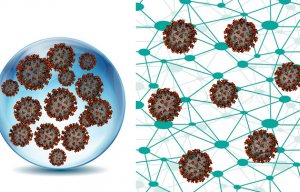
Capture Coating effectively kills Covid-19 indoors
Sales of Landex Coat Flame Retardant Clear will start on September 1.
andwithoutLandexCoatFlameRetardantCleartreatment-274x408-boxed.jpg)
25th August 2017
Innovation in Textiles
|
Tokyo
Landex Coat Flame Retardant Clear, the halogen-free aqueous transparent acrylic flame-retardant coating, is said to significantly improve the flame retardancy of diverse combustibles, including timbers, papers, fibres, rubbers and plastics. The transparent coating is simply applied to the surface to maintain the material’s original texture.
Sales of Landex Coat Flame Retardant Clear will start on September 1. Dainichi Giken expects it to produce sales revenue of one billion JPY by fiscal 2020.
Landex Coat Flame Retardant Clear uses FCX-210, Teijin’s phosphorus flame retardant made with Teijin’s proprietary molecular-design technology, which maintains the original properties of base resins using only small amounts.
FCX-210, developed mainly to improve the flame retardancy of resins, is used widely in electronics and automobiles parts and now is finding uses in other fields where high flame retardancy is required, such as architecture and interior design. Teijin is targeting flame-retardant business sales revenue of three billion JPY by fiscal 2020.
Landex Coat Flame Retardant Clear, in addition to maintaining the colour shades and textures of materials in living spaces, also strengthens resistance to weather and mould, according to the manufacturer. Its range of applicable materials is much wider than those of conventional flame retardants.
Dainichi Giken will apply to have Landex Coat Flame Retardant Clear certified as a non-combustible material and receive a VTM-0 rating for thin films under the UL 94 standard. Incorporation of Teijin’s FCX-210 flame retardant enables Landex Coat Flame Retardant Clear to qualify as a halogen-free material.
Japan’s Act to Promote the Use of Wood in Public Buildings was enacted in 2010 to stimulate increased use of wood in large buildings, but wood’s relatively low fireproofing and fire-resisting properties have hindered the implementation of this policy. According to the Fire and Disaster Management Agency’s statistics in 2016, more than 11,000 residential fires occurred in Japan, resulting in some 900 deaths, 70% of which were elderly people of ages 65 or above.
To ensure greater safety for people evacuating burning buildings, there is a strong demand for the use of more flame-retardant wood, paper and fabrics in interior materials. However, wood impregnated with conventional flame retardants eventually loses its appealing texture and appearance. While acrylic-resin coatings can help prevent this process, their range of use is limited due to their combustibility. In addition, widely used flame-retardant coatings impair the original textures and appearances of materials and are limited in their range of applicability.
In response, Dainichi Giken’s expertise in aqueous inorganic polymers, Teijin’s phosphorus flame retardant incorporating proprietary molecular-design technology, and Daimaru Kogyo’s special acrylic resin have been leveraged to develop Landex Coat Flame Retardant Clear for use with a wide range of combustible materials without impairing their original textures.

Business intelligence for the fibre, textiles and apparel industries: technologies, innovations, markets, investments, trade policy, sourcing, strategy...
Find out more